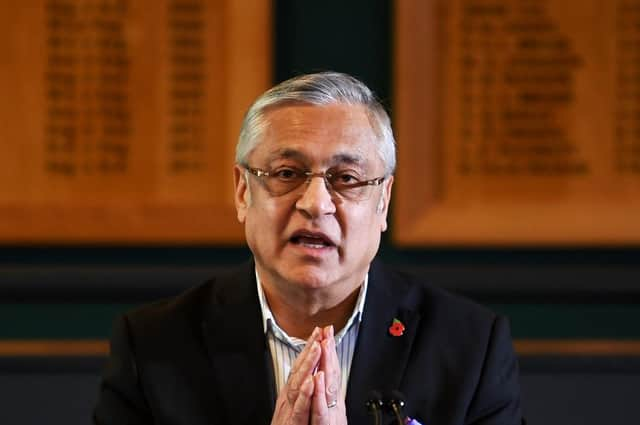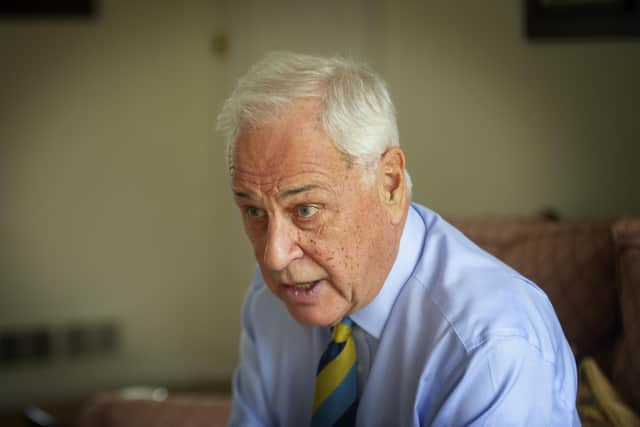Yorkshire CCC civil war between Lord Patel and Robin Smith needs ending now - Chris Waters


The first shots were fired in the middle of last month.
Smith, the last but one chairman before Roger Hutton’s ill-fated tenure, called on the Yorkshire members to take aim and gun down Patel’s proposals to make key changes to the club’s board that would allow up to eight non-members to join a 12-strong body.
Smith said that would put Yorkshire cricket in the hands of “strangers”, effectively enable a takeover that would end Yorkshire’s 159-year history as a members’ club, and leave it prey to “external manipulation, including political pressure”.


Advertisement
Hide AdAdvertisement
Hide AdThanks chiefly to Julian Knight MP, chair of the DCMS select committee, there has been quite enough political pressure in Yorkshire cricket of late, with Knight having stated – with jaw-dropping prejudgement – that he could see no reason why the previous board should remain in situ even before he had conducted his own hearing into the Azeem Rafiq racism crisis.
The closest equivalent, perhaps, would be Sue Gray demanding Boris Johnson’s head before delivering her “partygate” report. Knight, a slightly less offensive version of Michael Gove, is clearly unfit for office.
Patel’s counter to Smith’s argument – as the club seeks to recover from that crisis and chart a way forward – is that the proposed changes would be “a positive move which will improve the necessary skills, experience, expertise and diversity at board level and help create a welcoming and inclusive culture at the club”.
Patel said that members would retain ultimate veto over all board appointments as well as enjoy two representatives of their own on the board, thus giving them “a stronger voice”.


Advertisement
Hide AdAdvertisement
Hide AdSo far, so good. I can see both sides of the argument, but then I am not a Yorkshire member, although I would personally welcome the diversity that Patel is seeking.
Smith’s pistol, though, had not quite finished discharging its bullets. After questioning the process by which Patel was appointed (specifically, that he had yet to be elected to the board by the members), Smith has now questioned Patel’s right to be chairman full-stop, following the discovery of an administrative error that forced the 11th-hour cancellation of Wednesday’s extraordinary general meeting that was due to vote on the proposed board changes.
Why does this matter? Well, those changes are said by Patel to be essential for the return of international cricket to Headingley, as Yorkshire strive to show that they are a club unrecognisable, but, just as importantly, because Yorkshire’s failure to upload the relevant, amended club rules to the Financial Conduct Authority means, according to Smith, that Patel’s appointment is invalid as a prior non-member.
Consequently, Smith believes that Patel had no right to sack the 14 staff members for signing a confidential letter to the old board that questioned Rafiq’s motives, or, indeed, to take any decision, financial or otherwise.
Advertisement
Hide AdAdvertisement
Hide AdIt is thought that the cost of the “total clear-out” that Rafiq demanded is likely to be in the region of £3m; throw in some £200,000 paid to him after Patel settled an employment tribunal claim, and Smith believes that Patel is “personally liable” for all monies spent as opposed to the club.
As a civil war simmers behind the scenes, my own view with regards to the sacked 14 is that two wrongs do not make a right, so to say, and that the decision to remove some who were not even at the club at the time is not simply wrong, but immoral.
Granted, there was likely external pressure on Patel to “drain the swamp”, as the politicians like to put it, but it strikes me as strange indeed that a man who delivered, in my opinion, a richly impressive first press conference on his unveiling as chairman in November – one that struck a notably conciliatory and compassionate tone – not only took that decision but has since sought to justify it.
Ditto, after all the talk of openness and transparency supposedly ushered in by the new regime, that Patel has presided over a media policy that has meant that The Yorkshire Post, for example, has been granted one interview in the past three months (with Patel, but with no players or coaches) and was not allowed into a recent members’ forum, thus preventing members unable to attend a comprehensive account of what happened. At a time of huge significance in the club’s history, to discard all media from that event was worryingly myopic.
Advertisement
Hide AdAdvertisement
Hide AdDitto, when perceived in the overall context of things, the contradictory situation concerning Gary Ballance. Writing as one who very much wants to see Ballance continue a long and successful career at Yorkshire, it is surely absurd that the one man who we definitely know used racist language towards Rafiq (albeit in what Ballance claimed was in a friendly, back-and-forth manner with a former close friend on social nights out) is still at the club, while pretty much everyone else has either resigned or been sacked. Ballance has not actually apologised either, remember – Rafiq’s ‘second chance’ litmus test.
This is not a club that appears to be operating on even remotely coherent lines; rather, it seems as deficient, in its own way, as the Hutton regime.
Patel has rightly given Ballance a second chance and the opportunity to learn from past mistakes, but the sacked 14 is the biggest gripe for Smith and many members too, as was clear – or so I am told – at the members’ forum.
Smith was clearly part of the old regime, and he has a different take on the Rafiq situation, but Patel’s claim that Smith is trying to “destroy” the club, that his activities are actively working against the return of international cricket and, by definition, the club’s survival, smacks of a concerning attempt to shut down free speech and alternative viewpoints.
Advertisement
Hide AdAdvertisement
Hide AdIndeed, there is a totalitarian tone to the “we must do it this way or else” approach that the club seems to be adopting, one which Smith believes is disrespectful to members.
What needs to happen now – amid the seemingly endless reputational damage – is for the respective parties to come together, including the members, to thrash out and vote on all of the individual issues and decisions taken.
Then, and only then, can fair and transparent progress be made and the positive change that everyone wants, Lord Patel and Robin Smith included, be properly achieved.
Comment Guidelines
National World encourages reader discussion on our stories. User feedback, insights and back-and-forth exchanges add a rich layer of context to reporting. Please review our Community Guidelines before commenting.